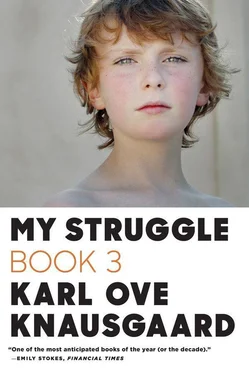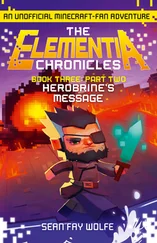Ketil had walked down to the old, tumbledown pontoon, where he stood skimming stones he must have found on the beach nearby. The water was like a mirror, and every time a stone hit the water, small circular ripples spread outward.
I had flicked through three or four magazines when he reappeared in front of us. I looked up at him.
“It feels good to lie on your stomach and read them,” I said.
“Ha ha ha! So you like rubbing yourself?” he said.
“Yes,” I said.
“I can imagine,” he said. “But I’ve got to be off now. Keep the mags if you like. I’m sick of them.”
“Can we have them?” Geir said.
“Be my guest.”
He kicked the bike stand, raised a hand to say goodbye, and set off up the hill with one hand in the middle of the handlebars. It looked as if he were leading an animal.
It was so obvious to us both that Geir would have to hide the magazines in his room that we didn’t even talk about it when we parted outside my house an hour later.
Mom’s pizzas had thick bases that rose around the edges, making the filling of minced meat, tomato, onions, mushrooms, peppers, and cheese look like a plain surrounded by long ranges of mountains on all sides. We were sitting at the living-room table, as always on Saturday evenings. We had never eaten in front of the television; that belonged to the realm of the unimaginable. Dad cut a piece for me and put it on my plate, I poured myself a glass of Coke from the liter bottle where the words Coca-Cola were printed in white on the greenish glass, not on a red label, which you also saw. Pepsi-Cola wasn’t sold in Sørland, I had drunk it only at the Norway Cup, and apart from the Metro and the breakfast where we could help ourselves to as many bowls of cornflakes as we wanted, that had been one of the tournament’s biggest attractions.
When the pizza was finished, Dad asked if we felt like playing a new game.
We did.
Mom cleared the table; Dad fetched a pad of paper and four pens from his study.
“Would you like to join in, Sissel?” he shouted to Mom, who had started washing up.
“Love to,” Mom said and joined us. She had soap lather on one arm and her temple. “What are we going to play? Yahtzee?”
“No,” Dad said. “We each have a piece of paper and we write down six headings: country, town, river, sea, lake, and mountain. One column for each. Then we choose a letter and the idea of the game is to jot down as many names as we can that begin with the respective letter in three minutes.”
We hadn’t played this one before. But it seemed like fun.
“Is there a prize?” Yngve said.
Dad smiled.
“Only the honor. Whoever wins becomes the family champion.”
“You start,” Mom said. “I’ll put some tea on for us.”
“We can do a trial run,” Dad said. “Then we can actually play when you’re back.”
He looked at us.
“M,” he said. “So, the letter M. Are you with me?”
“Yes,” Yngve said, and was already writing, with one arm shielding his work.
“Yes,” I said.
Mont Blanc, I wrote under mountain. Mandal, Morristown, Mjøndalen, Molde, Malmö, Metropolis, and Munich under town. I couldn’t think of any seas, or rivers. Next was countries. Were there any countries beginning with an M? I went through all the countries I could think of. But no. Moelven. Was that a river? Mo in Rana, that was a town anyway. Midwest? Oh, right, Mississippi!
“Time’s up,” Dad said.
A quick glance at their pieces of paper was enough to confirm that they had beaten me.
“You read yours out, Karl Ove,” Dad said.
When I got to Morristown both Dad and Yngve were laughing.
“Don’t laugh at me!” I said.
“Morristown only exists in The Phantom ,” Yngve said. “Did you think it really existed?”
“Sure. And why not? Sala works in the UN building in New York, and that exists, doesn’t it? Why shouldn’t Morristown?”
“Good answer, Karl Ove,” Dad said. “You get half a point for that.”
I made a face at Yngve, who smirked back.
“Tea’s ready,” Mom said. We went into the kitchen and took a cup. I added milk and sugar.
“OK, let’s play properly now,” Dad said. “We’ll do three letters. That’s probably as much as we can manage before bedtime.”
Mom knew almost as few names as I did, it turned out. Or else she wasn’t concentrating as much as Yngve or Dad. However, it was good for me; it was the two of us against them.
After Dad had counted the points from the first round, Mom said she had changed her name.
“I’ve gone back to my old maiden name. So now I’m Hatløy and not Knausgård anymore.”
My blood ran cold.
“You’re not called Knausgård anymore?” I said, staring at her with my mouth open. “But you’re our mother!”
She smiled.
“Yes, of course I am! I always will be!”
“But why? Why aren’t you going to have the same name as us?”
“I was born Sissel Hatløy, as you know. That’s my name. Knausgård is Dad’s name. And your names!”
“Are you getting divorced?”
Mom and Dad smiled.
“No, we’re not getting divorced,” Mom said. “We’re just going to have different names.”
“But a rather stupid consequence of this,” Dad said, “is that we can’t meet Grandma and Grandad for a while. My parents don’t like your mother changing her name, so they don’t want to see us anymore.”
I gaped at him.
“What about at Christmas?” I said.
Dad shook his head.
I started crying.
“This is nothing to cry about, Karl Ove,” Dad said. “It’ll pass. They’re just angry now. And then it’ll pass.”
I scraped my chair back, got up, and ran to my room. After closing my door I heard someone follow. I lay down on the bed and bored my head into the pillow while sobbing loudly with tears flowing as they had never flowed before.
“But, Karl Ove,” Dad said behind me. He sat on the edge of the bed. “Don’t get so upset. Is it that much fun with Grandma and Grandad?”
“Yes!” I shouted into the pillow. My whole body was contorted in convulsive sobs.
“But if they don’t want to see your own mother. It’s not much fun seeing them then, is it? Surely you understand, don’t you? They don’t want to see us.”
“Why should she change her name?” I shouted.
“It’s her real name,” Dad said. “It’s what she wants. And neither you nor I nor Grandma nor Grandad can deny her that right. Can we?”
He placed his hand on my shoulder for a fleeting moment. Then he stood up and left the room.
When the tears had dried up I picked up the book Mom had bought me and carried on reading. At the back of my mind I was aware that Yngve had gone to bed, that the sliding door was closed, that they were playing music in the living room, but without a scrap of it sticking. From the first sentence I plunged headlong into the story and fell deeper and deeper. The main character was Ged, a boy who lived on an island and had special gifts, and when this was discovered he was sent to a school for wizards. There it came out that his gifts were extra-special, and once when he had to perform for the others, in an act of excessive arrogance, he opened the door to the other world, the underworld, the kingdom of death, and a shadow stole out. Ged was dying, he was weak, with failing powers, for many years afterward, marked for life, and the shadow pursued him. He fled from it, hid in some obscure place somewhere in the world, abandoned all his ambitions knowing that what he had done, the simple wizardry tricks, was just empty gestures and pretense, that there was another, a more profound kind of magic woven into all existence, and it was to maintain the balance here that was a wizard’s real responsibility. All objects and all creatures had names corresponding to their essence, and only by knowing the objects’ and creatures’ real names could they be controlled. Ged could do that, but he didn’t reveal that he could, because every spell, every act of wizardry, affected the balance, something else could happen somewhere else, which could not be foreseen. The villagers where he had settled thought therefore that he was a poor wizard; after all he wouldn’t perform even the simplest tricks with which every village wizard plied his trade. He was young, serious, there was a large scar across his face, he was sensitive to cold, but when the chips were down, when he really had to use his gifts, he did. Once there was a child dying. He followed it into the kingdom of death and brought it back, even though he shouldn’t have, even though it was dangerous, for if there was one balance that should not be upset, it was that between life and death. But he did it and almost died in the process. The villagers saw for the first time who he was. And the shadow that he had released from beyond, who all this time had been flitting around the world after him, saw him, because whenever he used his powers, it noticed and came closer. He had to leave. And he did, in a boat on the sea between islands to the furthest shore. The shadow came closer and closer. After several confrontations, with Ged near to death, came the final showdown. All the while he had been trying to find the name of the shadow. He had scoured reference works about creatures from the oldest times, asked other, more intelligent wizards, but in vain, the creature was unknown, nameless. Then he knew. On the sea, alone in a boat, with the shadow getting closer and closer, he knew. The shadow was called Ged. The shadow had his name. The shadow was himself.
Читать дальше












